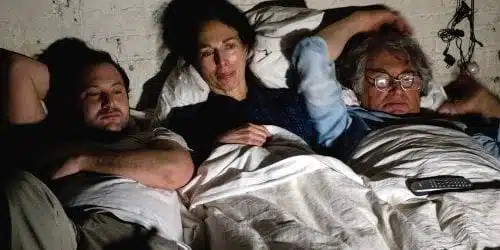
Mikey, the emotionally stunted 30-something of Azazel Jacobs’ Momma’s Man, is a familiar protagonist to anyone who’s acquainted with Judd Apatow’s male-centric, mainstream comedies. Like Steve Carell’s 40 year-old virgin, he is obsessed with comic books and action figures. And like famous loveable loafers Seth Rogan and Will Ferrell, Mikey spends most of his days behaving like an oversized baby: needy, sleepy and navel gazing.
In an unostentatious portrayal by the talented Matt Boren, Mikey reveals himself to be more absurd and more tragic than his clownish counterparts. Unlike the leads in Step Brothers, Pineapple Express and Talladega Nights, he isn’t the subject of an overdrawn sketch comedy routine. Rather, he is the self-imprisoned soul of Generation Y, making Momma’s Man, Jacobs’ most recent feature a revelation. By turns hysterically funny, profoundly depressing, and ultimately touching, the film is a poignant portrait of arrested development in contemporary America.
We first meet Mikey at what is supposed to be the tail end of his brief visit to his pre-boomer parents in New York City (Ken and Flo Jacobs, the filmmaker’s biological father and mother). But instead of catching his flight back to his wife and newborn baby in Los Angeles, Mikey finds himself unable to disembark from his subway stop at JFK Airport, and returns to his parents’ Chambers Street apartment. There he climbs into his childhood bed, dons his childhood superhero cape, and begins a pattern of steady regression.
At first his parents are overjoyed when Mikey announces that he’s extending his visit for a day or two. But as it becomes abundantly clear that their son has no intention of leaving in the immediate future, his parents grow increasingly concerned.
Momma’s Man intentionally blurs the line between invention and autobiography: Jim Jarmusch by way of Chris Smith. It was shot in the lower Manhattan apartment where Jacobs was raised, and features the filmmaker’s father Ken Jacobs, one of the leading figures in avant-garde film, whose entrancing short Capitalism: Child Labor is included in the DVD release. It also features the director’s mother — and Ken’s lifetime collaborator Flo — who in Momma’s Man shines as a brilliant comic and sympathetic character, an archetypical Jewish “ma”.
The central narrative of the film follows Mikey’s lapse into childhood as he stops shaving, wanders his apartment in his underwear, mulls over a break-up letter sent to him from his high school girlfriend, and picks up his guitar to pluck out adolescent love songs. Over the course of his recidivation, we catch glimpses of his profound anxiety over the future, as well as his creeping fears of whether he will ever find a home more hermetic, horrific, womblike and tomblike than his parents’ bric-a-brac mausoleum.
In addition to a smattering of enjoyable deleted scenes, the DVD release includes Rain Building Music, the director’s first film. A seven-minute compilation of home movie clips pieced together and narrated by Jacobs himself, the film is an even earlier excursion into the filmmaker’s childhood and an impressionistic exercise in learning how to cut, edit and make movies.
Rain Building Music is projected in the same apartment that is the setting for Momma’s Man, complete with off-screen commentary but Ken Jacobs and an off-camera appearance by Flo, as she returns home, turns on the lights, and puts away groceries. As Azazel Jacobs reports to his father, his professor at SUNY Purchase ominously predicts that this 1991 film will mirror all of the movies the young director would ultimately make, a claim confirmed by the intimate and autobiographical Momma’s Man.
Even more revealing is the extended biographical featurette Momma’s Family, in which the younger Jacobs wanders around his childhood home, ruminating about his youthful obsessions, sifting through ephemera, and reading from juvenilia that includes strikingly a collegiate letter volunteering employment to Jim Jarmusch.
Though the request was never answered, Jacobs is clearly indebted to Jarmusch, the independent filmmaker and purveyor of downtown New York City cool. Momma’s Man is of closer relation to Jarmusch’s Stranger than Paradise than to the current wave of so-called mumblecore movies by Andrew Bujalski, Aaron Katz and Joe Swanberg, even featuring a cameo by Richard Edson, or Eddie in Jarmusch’s first film. Momma’s Man is even of closer relation to Ronald Bronstein’s Frownland, another recent film based in New York and a real-life monster movie that celebrates eccentricity, depression and disgust in a city losing unique characters to the steady march of gentrification and time.
One of those lost souls is Piero Arcilesi, Azazel Jacobs’ childhood friend and a man in his 40s suffering from drug and alcohol addiction. Archilesi plays Dante in Momma’s Man and the featurette reveals that the role was promised as an agreement by the director that his friend to stay clean. By the time Momma’s Family is produced however, Archilesi has slipped back into addiction, a heartbreaking truth captured by the filmmaker at the conclusion of the 42-minute documentary.
For better or worse, recent movies like Knocked Up, Step Brothers and Pineapple Express have accurately captured the psyche of the modern American male, and have transformed it into a veritable zeitgeist. But nothing in the collective works of Judd Apatow will ever prepare you for the straight, male sing-along of Indigo Girls’ “Closer to Fine” by the childhood friends Mikey and Dante in Momma’s Man, a movie that is both far more bizarre, and bizarrely more true to life than any of those films.

